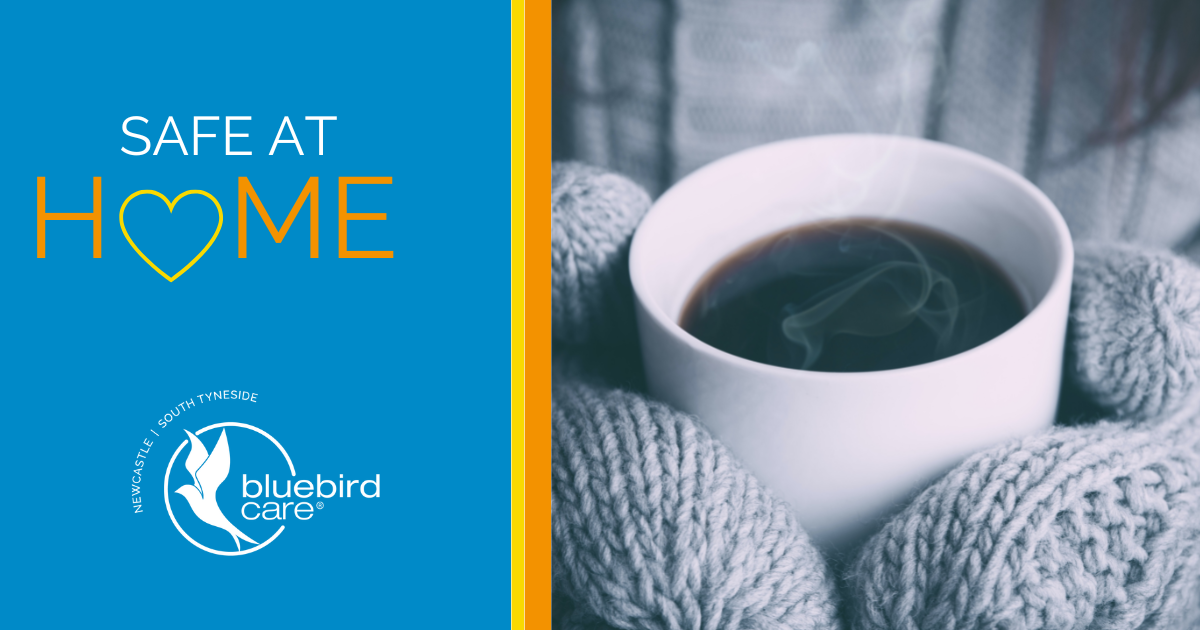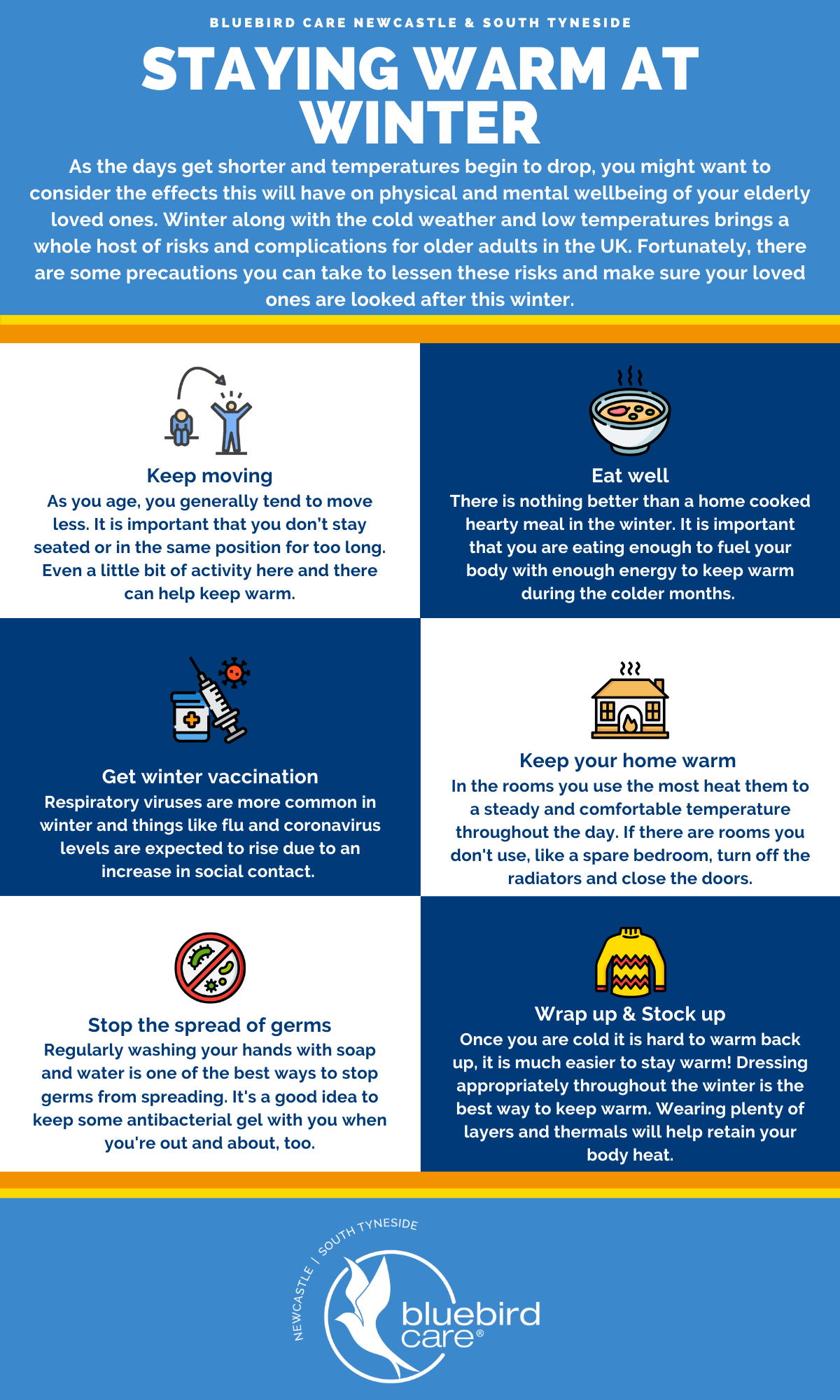Staying warm at winter
As the days get shorter and temperatures begin to drop, you might want to consider the effects this will have on physical and mental wellbeing of your elderly loved ones.
Staying warm at winter
Staying warm at winter can be hard, but it is vitally important.
As the days get shorter and temperatures begin to drop, you might want to consider the effects this will have on physical and mental wellbeing of your elderly loved ones. Winter along with the cold weather and low temperatures brings a whole host of risks and complications for older adults in the UK. Fortunately, there are some precautions you can take to lessen these risks and make sure your loved ones are looked after this winter.
One of the biggest problems for many older adults is staying warm at winter. Especially when they live on their own. When temperatures fall below 8C, older adults can have an increased risks to their health. Things like heart attacks, strokes, flu, pneumonia, and in serious cases of low temperatures, hypothermia, are all things which can be avoided!

Things to stay warm at winter
As you get older, your immune system weakens, and you are not as strong as you used to be. It becomes harder to fight off viruses and you experience illness easier. The cold makes health conditions harder to manage – it can even affect your hearts and circulation. The body goes through big changes when you get older. You gradually lose muscle mass and you move around less which makes it hard for you to keep warm.
The good news is that there is plenty to do to help ourselves during the winter months.
Here are some tips we have pulled together:
Keep moving:
As you age, you generally tend to move less. It is important that you don’t stay seated or in the same position for too long. Even a little bit of activity here and there can help keep warm. It will also have great benefits on your strength and mobility.
Eat well:
There is nothing better than a home cooked hearty meal in the winter. It is important that you are eating enough to fuel your body with enough energy to keep warm during the colder months.
The cost of living this winter can be very worrying for a lot of us. Preparing meals in bulk can not only help you be prepared but it can save money on grocery shopping and energy used to cook.
Having enough stores in the cupboards is vitally important in case for whatever reason you cannot make it to the shops. Check out our warm up and stock up section below!
Get winter vaccinations:
Even if you are fighting fit it is important to get your vaccinations. Respiratory viruses are more common in winter and things like flu and coronavirus levels are expected to rise due to an increase in social contact.
You're entitled to a free flu jab from the doctor or pharmacist if:
- You're aged 50 or over
- You care for someone, such as a friend or family member
- You have a serious long-term health condition
- You live in the same house as someone who is immunocompromised
- You're in long-stay residential care
When you get your flu jab, check if you're also eligible for the pneumo vaccine, which helps protect you from pneumonia, and the Shingles vaccine.
Keep your home warm:
In the rooms you use the most try to heat them to a steady and comfortable temperature throughout the day. If there are rooms you don't use, like a spare bedroom, turn off the radiators and close the doors. This will help you reduce your energy costs. Close all the curtains at dusk to help keep heat in on an evening before the colder temperatures at night.
This winter there is additional support to help you with the rise in energy bills. Make sure you investigate it and use it. Do not suffer in silence and struggle to warm your home!
The UK government also provides financial support to help cover heating costs. Anyone born on or before 5 November 1953 could qualify for a Winter Fuel Payment and receive £100 to £300 towards heating bills. Most eligible people will automatically receive the payment, but you may need to make a claim. In particularly cold weather, when temperatures fall below zero for seven consecutive days, they might also qualify for a Cold Weather Payment.
Stop the spread of germs:
Regularly washing your hands with soap and water is one of the best ways to stop germs from spreading. It's a good idea to keep some antibacterial gel with you when you're out and about, too.
You can also:
- Catch coughs and sneezes in a tissue
- Choose to wear a face covering in busy indoor spaces, like shops
- Leave windows ajar to let fresh air circulate when meeting people indoors
- Avoid close contact with people who are unwell.
Warm up and stock up:
Once you are cold it is hard to warm back up, it is much easier to stay warm! Dressing appropriately throughout the winter is the best way to keep warm. Wearing plenty of layers and thermals will help retain your body heat so you don’t suffer the effects of the low temperatures.
Blankets, blankets and more blankets. Having blankets to hand in the house is a great way to get warm and stay warm. It locks in the heat and it is easy to control how much.
It's a good idea to keep your cupboards stocked with some basics just in case you can't get out to the shops – whether due to illness or bad weather. Things that are non-perishable like tinned soup, canned beans, canned fish, biscuits, pasta, rice and sauces are great to have to hand. These are easily cooked and can be a great source of energy to warm you up.

Home care for the elderly in their own homes
Some people worry that home care will restrict their loved one’s independence and freedom. However, home care packages can be tailored to suit your family’s needs, however big or small they may be. It can be as simple as someone visiting your Mum to check on the heating or to have a chit chat over a cup of tea.
Whether you’re looking for someone to do the shopping during bad weather, prepare warming meals or provide personal services, our care at home packages can help.
We're here for you
If you are looking for home care in South Tyneside contact us and our dedicated team will be on hand to assist you with any queries and discuss what options we have available.
How to find the right care for you or your relative
1. Find your local office
Bluebird Care delivers care from locally based offices, find yours to start your care journey today.
2. Get in touch with us
Fill in our call back form or give us a call to find out how we can help you.
3. Assessment
We’ll come out to you to find out what you or your loved one needs to help stay independent at home.
4. Care team chosen & care starts
You'll be cared for by our specially trained team to support you to remain at home for as long as possible.

